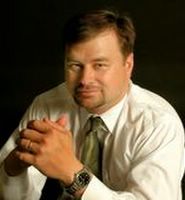Book Review: Liberal Fascism by Jonah Goldberg
by Jonah Golberg
Traditional conventional wisdom suggests that the political spectrum, far from being a straight line between left and right, is more of a circle. At the top of the circle, sit the liberal democracies. At bit on the left of the top of the circle sit European social democracies, such as Sweden. A bit on the right, sit the more conservative democracies like the United States. And at the bottom of the circle sit totalitarian states: to the left, the Stalinist U.S.S.R and Maoist China, and to the right, Nazi Germany and Fascist Italy. Jonah Goldberg, however, finds this model problematic.
In his book Liberal Fascism Goldberg rejects this circular model on the basis that the political spectrum is only logical when considered as a straight line from left to right. Classic fascist states, he argues, clearly belong on the left side of the spectrum.
Upon reading this thesis I instinctively found it disturbing as if it seemed to go against the natural order of things. Of course the Nazi's and the Italian Fascists were on the far right. Are they not our society's very definition of the far right?
Yet why, asks Goldberg, if the Nazis were so far right on the political spectrum, did they brand themselves as socialists? Indeed, the very word Nazi comes from a shortening of the party's official name, die Nationalsozialistische Deutsche Arbeiterpartei, - German for the National Socialist German Workers' Party. Similarly, why did Mussolini, whose parents read Das Kapital to him as a child, consider himself a 'socialist' right up until the moment of his execution at which his acolyte shouted, "Long live Mussolini, long live socialism!"
Goldberg argues, with considerable backing, that fascism began very much as a left-wing movement, with the added embrace of nationalism. In fact, Goldberg suggests that the first categorizing of fascists as right-wing only occurred after Stalin put out the directive that all opponents of the his rule of the Soviet Union, including Trotsky, were to be labeled as such in a bid for control of Germany.
Fascism, says Goldberg, was born of a "fascist moment" in Western civilization, when a coalition of intellectuals under various labels - progressive, communist, socialist - believed the era of liberal democracy was drawing to a close. Leaving little doubt with him that fascism was a project of the left.
Consider Cuba, prods Goldberg. Who can legitimately contest the fascist tendencies of its supposed leftist totalitarianism with its nearly lifelong military dictator Fidel Castro; its religion of fidelity to the state; the beatification of its martyr Che Guevara; and the brand of patriotism promoting "socialism or death"?
As to why he wrote the book, Goldberg, admits in part to a simple emotional impulse. As a conservative, he is tired of those on the left refusing to debate him on awkward facts, instead calling him a fascist, thus undeserving of consideration. The word fascist is more than just a modern synonym for evil; it puts a complete stop to all discussion. With its associations to the Nazi-ordered Holocaust, to be called a fascist is to be told your views are so repugnant they are not worthy of debate. (Ironically, the use of the label 'fascist' in modern debate is in itself becoming a fascist tactic to ending discussion.)
This book is of great importance, particularly as a healthy, open political debate is long overdue. With this book Goldberg has perhaps launched the political discussion that could rock our society's current thinking to its core.
With its clear writing, solid research and truly thought-provoking arguments, this book should be a must-read addition to every self-respecting political junkie's library.
Regardless of where you stand on the political spectrum, this book very much merits a look and a read it is one of the most startling polemics I have read.
A Must Read.


<< Home